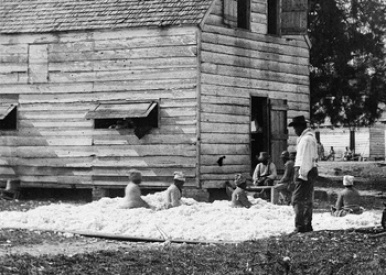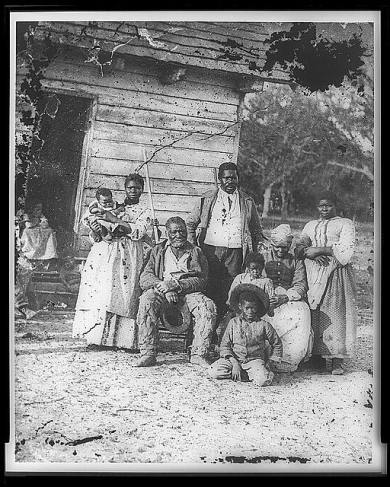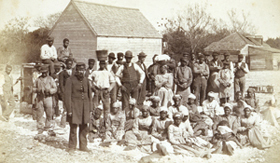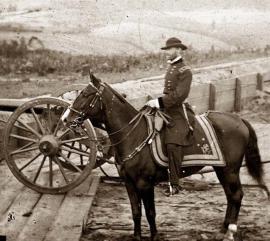Page under construction
Economics of Antebellum African-American Slavery
Was the Civil War About Slavery?
Taught By Ty Seidule
Course Description
What caused the Civil War? Did the North care about abolishing slavery? Did the South secede because of slavery? Or was it about something else entirely...perhaps states'
rights? Colonel Ty Seidule, Professor of History at the United States Military Academy at West Point, settles the debate. Transcript
For more information on the Civil War, check out The West Point History of the Civil War, an interactive e-book that brings the Civil War to life in a way that's never been done. Click here -> The West Point History of the Civil War .
Was-the-Civil-War-About-Slavery.pdf
Adobe Acrobat document [113.0 KB]
Measuring Slavery in 2011 Dollars - Measuring Worth
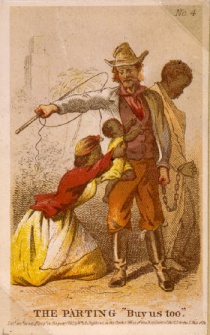 by Henry Louis Stephens, family is in the process of being separated at a slave auction. (Library of Congress)
by Henry Louis Stephens, family is in the process of being separated at a slave auction. (Library of Congress)
Measuring Slavery in 2011 Dollars* by Samuel H. Williamson sam@mswth.org
MeasuringWorth, University of Illinois at Chicago, and
Louis P. Cain, Loyola University Chicago, Northwestern University, lcain@northwestern.edu
Slavery was an ancient practice on the North American continent. Within the colonies that became the United States, slavery first appeared in Virginia in 1619.1 It was legal in all the British colonies, but it was practiced on a larger scale in what became the US South and the British Islands of the Caribbean. African slavery in the South was largely a response to the greater demand for labor on tobacco, rice, and indigo plantations. Northern farms were generally smaller, family-sized plots of land with the family supplying most of the labor. Before the American Revolution, there was no significant movement for abolition. By the early 1800s, most Northern states had passed laws in favor of abolition, but the acts called for gradual abolition.
In the South, on the other hand, slavery became an ingrained economic and legal institution. Slaves and their progeny were the property of an owner, and slaves were owned until they died. They could be bought and sold; their owners controlled their lives and those of their children. When slaves were sold, the contract was a legal document, even to the extent that a buyer could sue the seller if a slave was sold under false pretenses. Even slaves themselves had some protection under the law; they could not be abandoned or executed. Read more Measuring Worth.com
Measuring Worth - Measuring the Value of[...]
Adobe Acrobat document [332.4 KB]
The Economics of the Civil War, Roger L. Ransom. Distinguished Professor and Edward A. Dickson Emeritus, U.C. Riverside
The Economics of the Civil War, Roger L.[...]
Adobe Acrobat document [277.8 KB]
Slavery Historical Statistics, UCalRiver[...]
Adobe Acrobat document [65.2 KB]
The Economics of American Negro Slavery: Robert Evans, Jr.
(p. 185 - 256) (bibliographic info) (download)
The Economics of American Negro Slavery [...]
Adobe Acrobat document [1.0 MB]
The Structure of Slave Prices in New Orleans, Laurence J. Kotlikoff
The Structure of Slave Prices in New Orl[...]
Adobe Acrobat document [1.0 MB]
Industry and Economy during the Civil War, By Benjamin T. Arrington, National Park Service
National Park Service
Industry and Economy during the Civil Wa[...]
Adobe Acrobat document [73.1 KB]
April 1, 1861: Economics of slavery, by Allen Gathman, Apr-01-2011
April 1, 1861_ Economics of slavery _ Se[...]
Adobe Acrobat document [37.0 KB]
working_paper_385.pdf
Adobe Acrobat document [3.1 MB]
Traders’ Incentives and Pricing New Orleans Slave Market
20080903_w14281.pdf
Adobe Acrobat document [238.7 KB]
Civil War (US) (1861-65) New York Times, By Craig Symonds
Civil War (US) (1861-65) New York Times.[...]
Adobe Acrobat document [269.4 KB]


